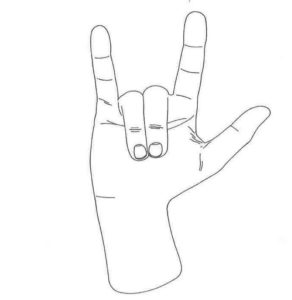27 Jun Trademarking slogans and gestures: what heavy metal can teach us
It ain’t easy being an aging rock god. You’ve got mortgages to pay, royalties are dwindling in the Spotify age, and the kids aren’t coming out to see you tour anymore. What’s a guy to do? If you’re like the singers for KISS and Styx, you may realize that trademarking slogans and gestures can be valuable.
Domo Arigato, Mr. Licensing Deal
1983 would not have been 1983 without the Chicago rock band Styx’s hit song “Mr. Roboto.” Vocalist Dennis Deyoung is credited with writing that song and its catchy refrain Domo arigato, Mr. Roboto. And in 2005 Mr. Deyoung asked the U.S. Patent & Trademark Office (PTO) for permission to be the exclusive owner of a “mark” consisting of that phrase. A “mark,” in the language of trademark law, is a valuable marketing asset — a phrase, word or symbol that distinguishes the provider of a particular product from others in the market. It is often the name of a company or its product, but can also include a famous lyric from a popular song. And that is why the PTO granted Mr. Deyoung’s request to use that mark.
Why might he find the mark valuable? Perhaps because he may wish to license it to apparel manufacturers. His application indicates that he may wish to use the mark in connection with products ranging from panties to rugby shorts to smoking jackets. And indeed, a number of e-commerce websites today sell clothes with the “Domo arigato Mr. Roboto” mark on them. (If any of them are doing so without a licensing agreement from Mr. Deyoung, he has powerful claims for trademark infringement against them).
A devils-horns by any other name
A trademark does not need to consist of words. It can even be a mere gesture. And KISS frontman Gene Simmons recently asked the PTO to recognize him as the originator of a particular gesture — the “devils-horns” beloved by heavy metal fans worldwide. People make this sign in various ways, typically as a raised hand, palm forward with the middle and ring finger curled down and the others outstretched. Shown below is the drawing of the gesture that Mr. Simmons submitted to the PTO.
For rock and metal fans, the devils-horns shows love for the music. And Mr. Simmons’ application asked that the PTO declare him the only person able to use the gesture in connection with live performances by musical artists (the “product” sold in International Class 41).
To be granted a trademark, an applicant must show the PTO that it was the first to use the mark in connection with the interstate sales of a product. Mr. Simmons’ argued that he was the first to use the devils-horns, “at least as early as” November 1974 — the date of the KISS “Hotter than Hell” tour. Music fans quickly cried foul. Many pointed out that Ronnie James Dio, the late Black Sabbath frontman, had used a similar gesture long before Mr. Simmons. Mr. Dio’s widow called Simmon’s request “disgusting,” arguing that the gesture “belongs to everyone” and should not be owned by any particular musician. Fans of the University of Texas football team, for their part, noted that Texas and other football teams have used the similar “hook ’em horns” gesture since the 1930s. And Deaf people have used it for decades at least as the American Sign Language sign for “love.”
None of this necessarily would doom Mr. Simmons’ application; he might be able to argue successfully that his usage of the devils-horns was different from the others. That would be easier in the case of the football teams. The point of trademark law is to prevent consumers’ confusion over competing products, and consumers are not at risk of confusing the leather-clad KISS for spandex-clad linebackers. But it would be a tougher sell in light of evidence that other touring musicians had used the mark, because unlike football, the “product” of live music is the same product category in which Mr. Simmons filed his application. And there is evidence that multiple musicians (Mr. Dio, Coven, and The Beatles, among others) had used the mark before KISS.
But in the end, the PTO will not decide this matter. Perhaps due to the public outcry, Mr. Simmons abandoned his request just a few days after making it. The devils-horns will continue to fly freely in stadiums worldwide.
The bottom line
Businesses invest serious time in developing phrases and symbols to market their products. This is as true for rock musicians as it is for companies that sell ketchup or software. A business can seek trademark protection for its own name, for the names of its products, for catchphrases it uses in advertisements, or even gestures. If you have questions about trademarking slogans and gestures, set up a meeting with our attorneys today.



